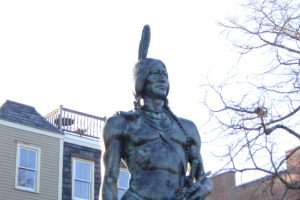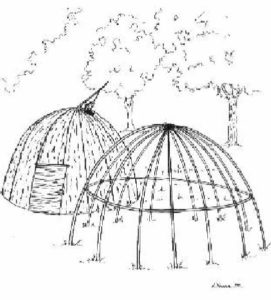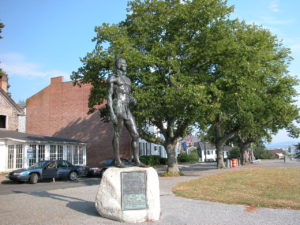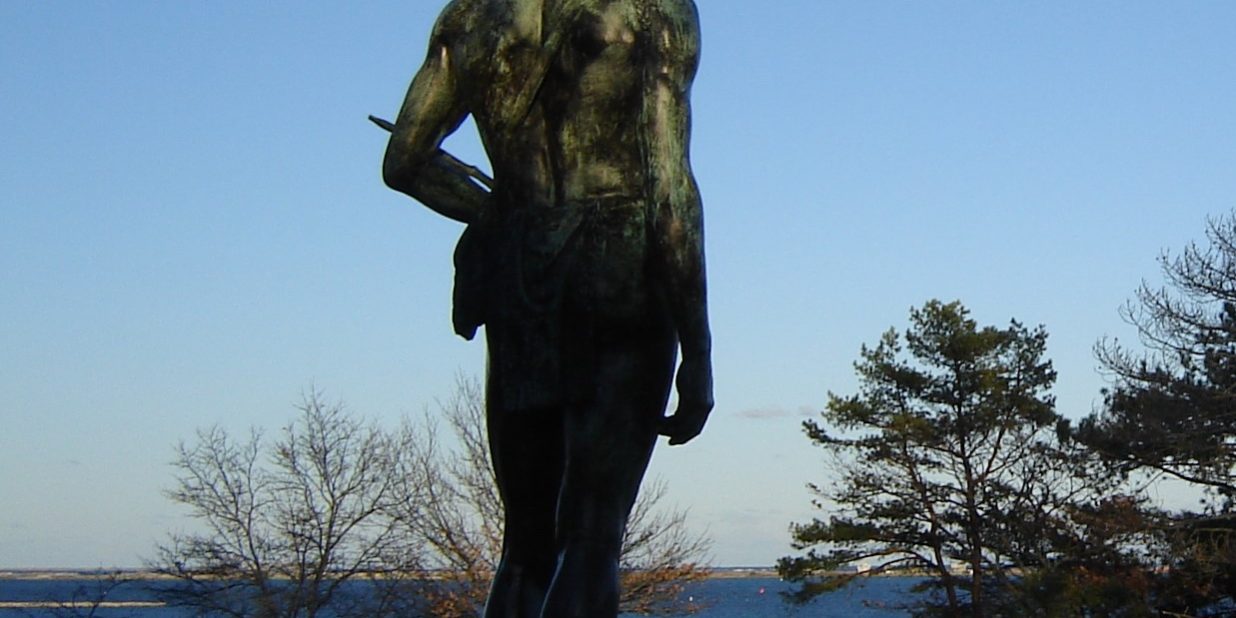“Blessed are the peacemakers, for they shall be called the children of God” said Jesus in his sermon on the Mount as recorded in Matthew 5:9. Though peace had been ratified with the Pilgrims’ closest neighbors and their great king, Massasoit, due to past injuries by the English, and also due to the challenge of overcoming a mountain of mistrust, it was imperative that they nurture tranquility.
William Bradford wrote, “Having in some sort ordered their business at home, it was thought meet to send some abroad to see their new friend Massasoit, and to bestow upon him some gratuity to bind him the faster unto them; as also that hereby they might view the country and see in what manner he lived, what strength he had about him, and how the ways were to his place, if at any time they should have occasion.”
In a bit more detail, Mourt’s Relation, probably written by Bradford and Edward Winslow, gives a more detailed account of their motive to preserve peace and the message they sent to their native neighbors:
It seemed good to the company, for many considerations, to send some amongst them to Massasoit, the greatest commander amongst the savages bordering upon us; partly to know where to find them, if occasion served, as also to see their strength, discover the country, prevent abuses in their disorderly coming unto us, make satisfaction for some conceived injuries to be done on our parts, and to continue the league of peace and friendship between them and us.
Note that to be a peacemaker one must offer to bless another (shalom – for peace) as well as take action to preserve peace (the Greek word for maker). Both the previous injuries by the English as well as those caused by the Pilgrims when they explored the Cape (the desecration of their graves as well as the taking of the corn they had found buried in the sand) were in need of repair.
 Note that they ordered their business at home so they could then reach out to further preserve and confirm peace with their neighbors. They determined to visit him at his home – in other words, take action. Also, they would bless them by bringing a gift. Finally, they wanted to make things right. Righting wrongs and apologizing for injuries done to others (whether real or perceived) are always necessary in preserving peace. But who would they send?
Note that they ordered their business at home so they could then reach out to further preserve and confirm peace with their neighbors. They determined to visit him at his home – in other words, take action. Also, they would bless them by bringing a gift. Finally, they wanted to make things right. Righting wrongs and apologizing for injuries done to others (whether real or perceived) are always necessary in preserving peace. But who would they send?
For these and the like ends it pleased the governor to make choice of Stephen Hopkins and Edward Winslow to go unto him; and having a fit opportunity, by reason of a savage called Tisquantum (Squanto), that could speak English, coming unto us, with all expedition provided a horseman’s coat of red cotton, and laced with a slight lace, for a present, that both they an their message might be the more acceptable amongst them.
 Hopkins was an experienced negotiator with Natives, having learned from his experience in Jamestown. Winslow desired to learn the native tongue and was an excellent ambassador. You need both a negotiator as well as an ambassador in order to preserve peace, whether in in your home, your neighborhood or church, or between nations. The message they brought, along these lines, again from Mourt’s, was this:
Hopkins was an experienced negotiator with Natives, having learned from his experience in Jamestown. Winslow desired to learn the native tongue and was an excellent ambassador. You need both a negotiator as well as an ambassador in order to preserve peace, whether in in your home, your neighborhood or church, or between nations. The message they brought, along these lines, again from Mourt’s, was this:
That forasmuch as his subjects came often and without fear upon all occasions amongst us, so we were now come unto him; and in witness of the love and good-will the English bear unto him, the governor hath sent him a coat, desiring that the peace and amity that was between them and us might be continued; not that we feared them, but because we intended not to injure any, desiring to live peaceably, and as with all men, so especially with them, our nearest neighbors.
 But whereas his people came very often, and very many together unto us, bringing for the most part their wives and children with them, they were welcome; yet we being but strangers as yet at Patuxet, alias New Plymouth, not knowing how our corn might prosper, we could no longer give them such entertainment as we had done, and as we desired still to do. Yet if he would be pleased to come himself, or any special friend of his desired to see us, coming from him they should be welcome. And to the end we might know them from others, our governor had sent him a copper chain; desiring if any messenger should come from him to us, we might know him by bringing it with him, and hearken and give credit to his message accordingly; also requesting him that such as have skins should bring them to us, and that he would hinder the multitude from oppressing us with them.
But whereas his people came very often, and very many together unto us, bringing for the most part their wives and children with them, they were welcome; yet we being but strangers as yet at Patuxet, alias New Plymouth, not knowing how our corn might prosper, we could no longer give them such entertainment as we had done, and as we desired still to do. Yet if he would be pleased to come himself, or any special friend of his desired to see us, coming from him they should be welcome. And to the end we might know them from others, our governor had sent him a copper chain; desiring if any messenger should come from him to us, we might know him by bringing it with him, and hearken and give credit to his message accordingly; also requesting him that such as have skins should bring them to us, and that he would hinder the multitude from oppressing us with them.
The delicate balance of letting friends know when they have overstepped their bounds without unnecessarily offending them is difficult. If you don’t preserve your ability to be hospitable (giving away all your store) you need to set boundaries for preserving relationships. They also offered to reconcile past offenses, a necessary ingredient between friends. From Mourts:
And whereas, at our first arrival at Pamet, called by us Cape Cod, we found there corn buried in the ground, and finding no inhabitants, but some graves of dead new buried, took the corn, resolving, if ever we could hear of any that had right thereunto, to make satisfaction to the full for it; yet since we understand the owners thereof were fled for fear of us, our desire was either to pay them for the like quantity of corn, English meal, or any other commodities we had, to pleasure them withal; requesting him that some one of his men might signify so much unto them, and we would content him for his pains. And last of all, our governor requested one favor of him which was that he would exchange some of their corn for seed with us, that we might make trail which best agreed with the soil where we live.
Let us learn from these examples to preserve peace in our day. Credit goes to the Natives who made the first move to come to the English, and then credit goes to the Pilgrims who reciprocated. In our day, disagreements are often taken as hatred and inflamed. Let us heed the words of Jesus and bless others, taking action to preserve relationships. Furthermore, let us be willing to right wrongs and apologize for offenses (real or perceived), that we might model such behavior for the next generation!







